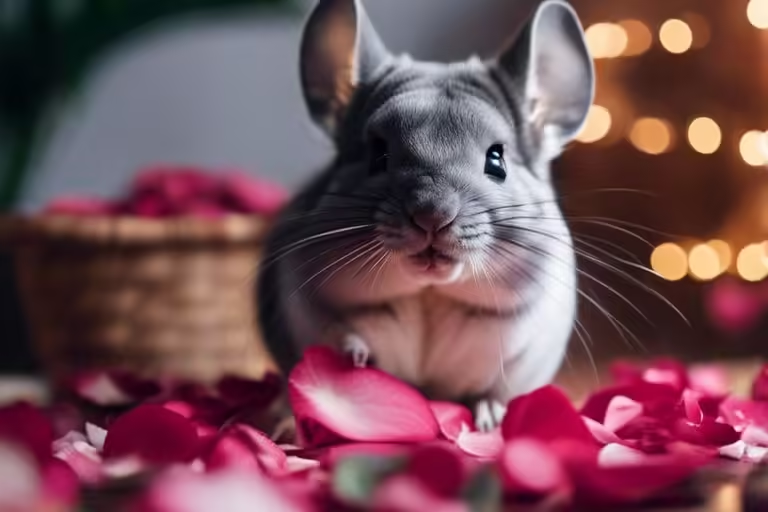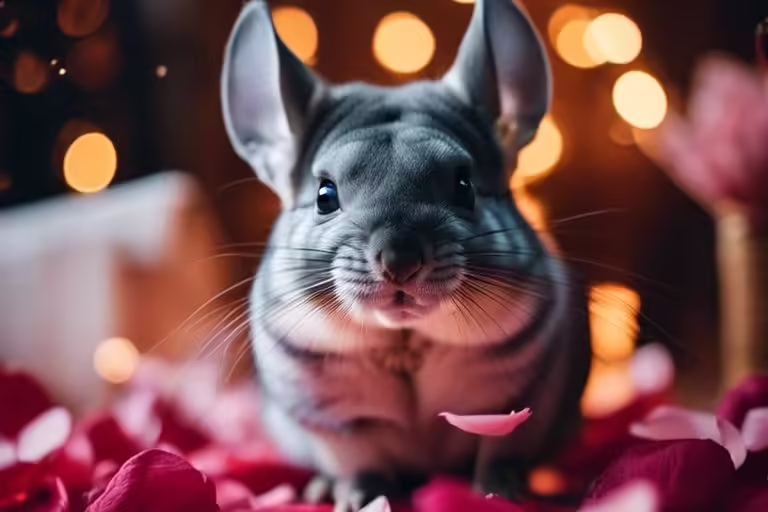There’s no doubt that chinchillas are adorable pets that require special care when it comes to their diet. In the matter of rose petals, it’s crucial to know what’s safe for your furry friend. In this guide, we’ll explore whether chinchillas can safely consume rose petals, the potential risks involved, and how to ensure the well-being of your cherished companion.
Key Takeaways:
- Chinchillas should not eat rose petals: Rose petals may be harmful to chinchillas due to their high sugar content and potential pesticide residue.
- Stick to safe chinchilla foods: Stick to a diet recommended for chinchillas, such as hay, pellets, and fresh vegetables, to ensure their health and well-being.
- Consult a vet for dietary advice: If you are unsure about what foods are safe for your chinchilla to eat, consult with a veterinarian for guidance and recommendations.
The Allure of Rose Petals
The Romanticism of Rose Petals
While rose petals are often associated with romance and love, their appeal extends beyond human relationships. The delicate fragrance and vibrant colors of rose petals have captivated people for centuries, making them a popular choice for various uses, including culinary and decorative purposes.
Why Chinchillas Might Be Interested
The allure of rose petals for chinchillas lies in their enticing aroma and attractive appearance. Chinchillas are naturally curious creatures, and the sight and smell of rose petals may pique their interest. However, it is crucial to understand the potential risks before offering them as a treat to your furry friend.
Petals: While chinchillas may be drawn to the scent and sight of rose petals, it is important to note that these flowers are not a safe or suitable food option for your pet. Rose petals contain natural compounds that could be harmful to chinchillas if ingested, potentially causing digestive issues or even poisoning. It is best to stick to a diet recommended by a veterinarian to ensure the health and well-being of your chinchilla.
Chinchilla Nutrition Basics
Dietary Requirements
Now, when it comes to your chinchilla’s diet, it’s imperative to provide them with a balanced mix of hay, pellets, fresh water, and occasional treats. Your chinchilla’s diet should consist mostly of high-quality hay, as it helps maintain healthy digestion and wear down their teeth.
Safe Food Options
Options for safe chinchilla food include hay, pellets, and limited fruits and vegetables. Safe fruits for your chinchilla include apples, bananas, and blueberries. Vegetables like carrots and bell peppers can also be given in moderation. Always ensure that any fruits and vegetables given to your chinchilla are fresh and thoroughly washed to remove any pesticides.
Bear in mind, while chinchillas can enjoy a variety of foods, it’s crucial to avoid giving them certain items like chocolate, avocado, and nuts as they can be harmful or even fatal to your furry friend. Stick to a diet of hay and pellets as the foundation of their nutrition, with occasional safe treats to keep them happy and healthy.
The Potential Risks of Rose Petals
Toxic Compounds in Rose Petals
All rose petals contain crucial oils that may not be suitable for your chinchilla to ingest. These oils can cause digestive upset and other health issues in your pet.
Choking Hazards and Obstruction
With their small size and delicate nature, rose petals can pose a choking hazard to your chinchilla. If your pet ingests a large amount of petals, it could lead to an obstruction in their digestive tract, which is a serious and potentially life-threatening condition.

Rose Petals as a Treat
Limited Quantity and Frequency
Unlike other treats, rose petals should be given sparingly to your chinchilla. They are high in fiber and natural sugars, so too many can upset your pet’s digestion.
Preparation and Presentation Tips
Quantity matters when offering rose petals to your chinchilla. Be sure to wash them thoroughly to remove any pesticides or chemicals. Offer a small amount at a time to prevent overeating.
- Wash the rose petals well before offering them.
- Only offer a small amount to prevent overconsumption.
- Assume that a few petals are enough for a treat.
Alternative Treat Options
Fresh Fruits and Vegetables
Not all fruits and vegetables are safe for chinchillas. While some can be a healthy addition to their diet, others can cause digestive issues. Your chinchilla can enjoy treats like apples, blueberries, carrots, and leafy greens in small amounts. Always wash them thoroughly and remove any seeds or pits before offering them to your pet.
Commercial Chinchilla Treats
To avoid any risks associated with feeding your chinchilla fresh fruits and vegetables, you may opt for commercially available chinchilla treats. One popular option is chinchilla pellets specifically formulated to meet their dietary needs. These treats are convenient and ensure your chinchilla receives necessary nutrients.
The key is to choose treats that are specifically made for chinchillas, as other small animal treats may not be suitable for your pet. Avoid treats high in sugar or fat, as they can lead to obesity and other health issues in chinchillas. It’s necessary to provide treats in moderation to maintain your chinchilla’s overall health and well-being.
Monitoring Your Chinchilla’s Health
Signs of Illness or Distress
Your chinchilla’s health is of utmost importance. With regular monitoring, you can easily spot signs of illness or distress early on. Keep an eye out for changes in behavior, such as decreased activity levels, lack of appetite, abnormal stool, sneezing, or discharge from the eyes or nose. If you notice any of these symptoms, it’s important to address them promptly to ensure your chinchilla’s well-being.
Consulting a Veterinarian
To ensure the best care for your chinchilla, it’s crucial to have a qualified veterinarian who is knowledgeable about exotic pets. Regular check-ups are recommended to keep track of your chinchilla’s health and address any concerns. If you notice any abnormalities or changes in behavior, do not hesitate to seek professional help. Your veterinarian can provide the necessary treatment and advice to keep your chinchilla healthy and happy.
Chinchillas are known to hide signs of illness well, so consulting a veterinarian at the first sign of trouble is important. Delaying treatment can lead to further complications and worsen your chinchilla’s condition. A qualified veterinarian can provide accurate diagnosis and appropriate treatment options tailored to your chinchilla’s specific needs. Regular check-ups can also help prevent any potential health issues and ensure your chinchilla’s long-term well-being.
Conclusion
On the whole, it is not recommended to feed your chinchilla rose petals. Even though they are not toxic, they can still cause digestive issues and be difficult for your chinchilla to properly digest. Stick to their regular diet of hay, pellets, and fresh water to ensure they stay healthy and happy.
FAQ
Q: Can chinchillas eat rose petals?
A: While chinchillas can technically eat rose petals, they are not recommended as they can be harmful to their digestive system due to the high levels of pesticides and chemicals often found in store-bought roses.
Q: Are dried rose petals safe for chinchillas to eat?
A: Dried rose petals should be avoided as well, as they can be too dry for chinchillas to properly chew and digest, leading to potential gastrointestinal issues.
Q: What are safe alternatives to rose petals for chinchillas to eat?
A: Safe alternatives to rose petals for chinchillas include fresh hay, chinchilla pellets, and small amounts of fresh fruits and vegetables such as apples, carrots, and leafy greens.
